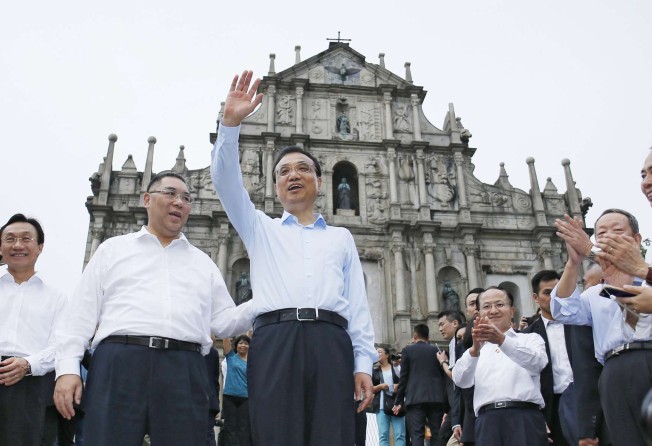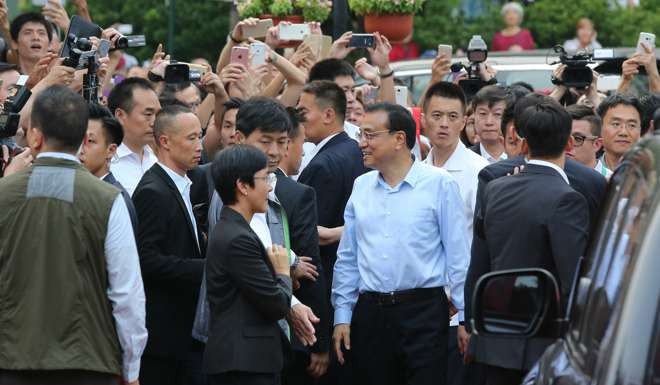Li Keqiang hails third-quarter performance as China economy steps out of slump
On visit to Macau, premier also offers assurances on employment and the housing market

China’s third-quarter economic performance was better than expected with the number of new jobs reaching the target for the entire year, the nation’s Premier Li Keqiang said in Macau on Tuesday.
Analysts said favourable data would give more room for Beijing to push forward its much needed structural economic reforms necessary for long-term growth.
More than 10 million new urban jobs were created in the first nine months, Li said at the 5th Ministerial Conference of the Forum for Economic and Trade Cooperation between China and Portuguese-speaking Countries.
“Entering the third quarter, China’s economy showed some positive changes, with increasing contributions from retail and services and stabilising indicators that had once suggested weakness or a slump,” Li said
He added that unemployment was also being well controlled. “In September, a survey in 31 major cities showed that the unemployment rate was less than 5 per cent – the first time in recent years,” Li said.
His first public comments about the quarterly economic performance – which come only days before a spate of new data – suggest Beijing can focus less on major economic problems and shift its attention to curbing the more immediate problem of a housing bubble in the nation’s major cities.
Li said industrial growth, corporate profits and investment, especially in the private sector, were stabilising and market expectations were improving.
He tried to calm fears about the housing market in major cities and concerns about mounting debt amid the slowdown in economic growth.
He said that in general, China’s debt risk was under control, with the main issue being a structural imbalance – highly leveraged non-financial enterprises.
China, however, had limited foreign debt exposure, which reduced the likelihood of debt risks, he said.
On the housing front, Li said Beijing would continue to strengthen the responsibility of local governments to carry out “targeted policies in different cities” to guide stable development of the housing market.
Fears about an imminent hard landing for the world’s second-largest economy have abated since the summer, with improving economic indicators. But alarm over frothy home prices in big cities such as Shanghai and Nanjing has increased, triggering a series of tightening measures in as many as 21 cities during the nine days spanning the National Day holiday, which began on October 1.
On Monday, Beijing also unveiled guidelines for using debt-for-equity swaps and mergers to tame soaring levels of corporate leverage and reform state firms.

“Premier Li’s stance showed that the forthcoming third-quarter data could be optimistic and the worst of China’s economic plight may be over,” Jiang Mingde, chief economist at Hengtai Futures, said. “The housing bubble issue is now a policy priority.”
Jiang said the improved data could provide Beijing with more scope for carrying out its supply-side structural reforms.
Yu Pingkang, chief economist at Changjiang Pension Insurance, said he was not worried about third-quarter figures. “In the long haul, I am expecting supply-side structural reform to take a greater effect in steering China’s economic growth,” Yu said.
Beijing is still seeking a delicate balance between bolstering economic growth and averting asset bubbles. Its economy grew 6.9 per cent last year – the slowest increase in a quarter of a century.
Over the next five years, China’s imports are expected to top US$8 trillion, with outbound investment exceeding US$720 billion, while the number of mainland travellers heading abroad over the period is estimated to exceed 600 million, helping to create huge business opportunities for international companies, Li said.
“We are confident and capable of being able to accomplish the major economic targets this year and we are determined to stick to the bottom line of avoiding systemic, regional financial risks by laying a sound foundation for next year’s growth,” Li said.
Also at the event, Li announced that Beijing would launch 18 new measures over three years to promote cooperation with Portuguese-speaking countries in Asia and Africa.
The measures would include at least 2 billion yuan (HK$2.3 billion) in aid for areas including agriculture, trade and investment, as well as low-interest loans amounting to another 2 billion yuan.
Beijing would also exempt the repayment of 500 million yuan in interest-free loans from developing nations and provide assistance with training.